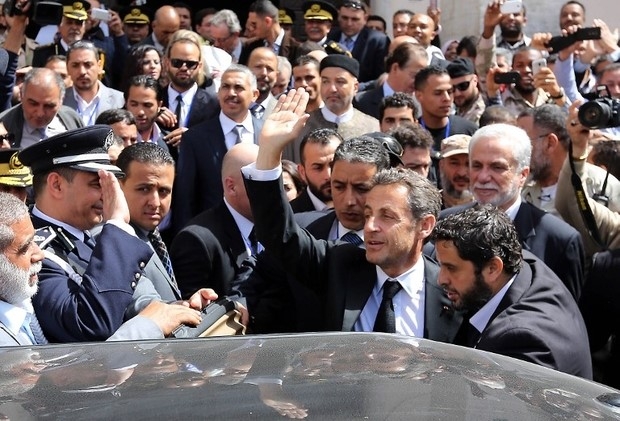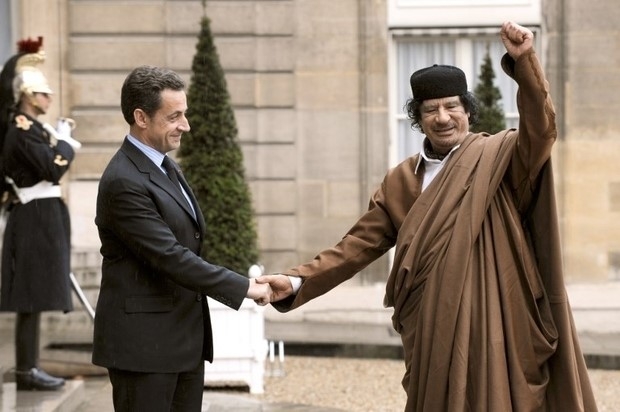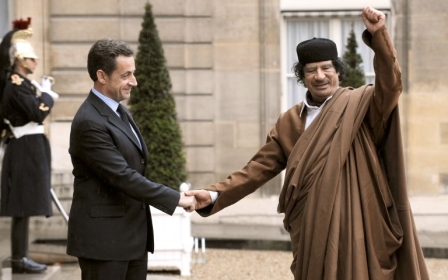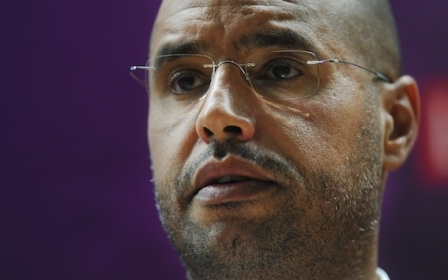'Gaddafi has come back to haunt him': In Libya, all eyes on the Sarkozy affair
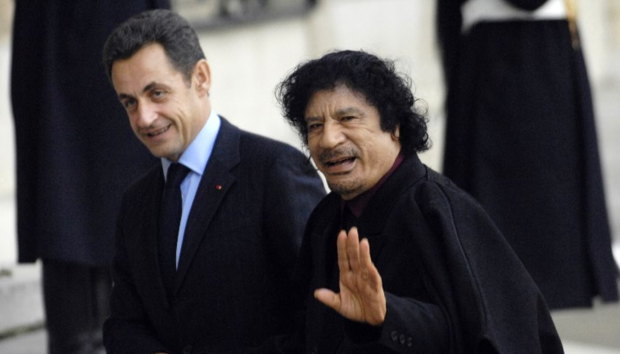
TRIPOLI – On March 2013, crowds flocked to Tripoli's town hall to welcome Nicolas Sarkozy, “the saviour of Libya”, as he climbed the red-carpeted staircase.
Officials, security personnel and customers from nearby cafes - everybody was hoping to touch him, to get a photo of their hero. The mayor at the time, Saddat al-Badri, was proud to have organised the visit marking the two-year anniversary of the French intervention in Libya.
Five years later, the former French president is still the centre of attention, but this time of the less-than-enthusiastic French judiciary.
After a five-year investigation into the presumed financing of his 2007 presidential bid by Gaddafi, Sarkozy was indicted late last month on charges of “passive corruption, illegal campaign financing, and concealment of Libyan public money”.
In the cluttered and dusty corridors of Tripoli City Hall, local officials have lost much of the 2013 enthusiasm, though they haven’t completely turned their back on the man who remains the country’s “saviour”.
“Every era is marked by a particular context. People and politics change accordingly,” Abdulrauf Beitelmal, Tripoli’s mayor since 2014, told Middle East Eye.
“We didn’t know Sarkozy took money from Gaddafi, those things were revealed little by little," said Saddiq Bouhdima, a member of the Local Association for Tripoli which is headquartered in city hall.
'Fifty million euros is next to nothing compared to the money Gaddafi spent'
- Saddiq Bouhdima, member of the Local Association for Tripoli
The 2011 revolution stemmed in part, he said, from the population's disgust with corruption. Still with irony, he said: “Fifty million euros is next to nothing compared to the money Gaddafi spent.”
All the same, said the association's president Jalel ben Omran, it's a “trifling sum” that should be returned to the state coffers. The country has been dealing with a serious cash shortage for the past two years, and Mediapart has reported that the Libyan government was considering filing a case in France to get Libya's money back.
“I’m all for Libya’s filing a civil case, but not in the Sarkozy case alone," Ben Omran said.
'A great misfortune for Libya'
Libyans know all about the former dictator’s penchant for distributing money and favours to leaders and opponents, particularly in Africa. The Libyan ruler used the oil-rich country’s wealth to gain influence abroad too.
Alamine Ashtiwi, a monarchist militant who supports the monarchy that ruled before Gaddafi, gave MEE a telling example.
“During an assembly of the African Union [AU], Gaddafi took the floor and threatened everyone present. ‘If any of you dare criticise my policies, you’ll find you’ll have another Idriss Deby on your hands!'" Ashtiwi recalled.
Deby overthrew Hissene Habre in Chad in 1990 with the help of Gaddafi's financial backing.
Yet up until the questioning and formal investigation of Sarkozy last month, Libyans had shown a certain amount of tolerance.
At the mention of a possible financial arrangement between Sarkozy and Libya’s former ruler, senior officials, armed group leaders, and political figures are all pretty much of the same opinion: translations like that, they say, were not illegal under the old regime.
Grateful for the support of Sarkozy, the former president of the Union for a Popular Movement (UMP), Libyans had long taken a lenient attitude towards him. But their leniency decreased as insecurity and instability in Libya grew.
In a cafe on Algeria Square, where the town hall of Tripoli is located, Ahmed spoke to MEE.
“The affair has been a great misfortune for Libya. If it hadn’t come to light, Sarkozy might have been elected in 2012. And then, he never would have abandoned Libya. He would have helped us and we wouldn’t find ourselves in the mess we are in today," said Ghoga.
'Nicolas Sarkozy destroyed our country. He owes an apology to the Libyan people'
- Abdelhamid al-Shandoli, spokesperson for the Council of the Warfalla Tribe
Opposite him, his friend Mohamed holds a more nuanced view.
“A good deed does not erase a bad, and vice versa," he said.
On social media, a user posted ironically: “Muammar Gaddafi has come back to haunt Sarkozy, unleashing evil spirits on Sarkozy to avenge his dishonourable end [after Gaddafi’s convoy was attacked by NATO bombers, he was lynched by rebel militia]."
Those with fond memories of the Great Jamahiriya - as Gaddafi called Libya - are happy with the turn of events. About 180km southeast of Tripoli in the Gaddafi-loyalist bastion of Bani Walid, revenge is on everyone’s lips.
'Everyone is talking about Saif al-Islam'
“Nicolas Sarkozy destroyed our country. Bani Walid’s university, town hall and houses were bombed. He owes an apology to the Libyan people," said Abdelhamid al-Shandoli, spokesperson for the Council of the Warfalla, the region’s predominant tribe.
On 20 March, the day Sarkozy was placed in police custody, family and followers of Saif al-Islam, Gaddafi’s favourite son, officially announced that their leader, who last appeared publicly in June 2014, was willing to travel to Paris to testify and provide irrefutable evidence that Sarkozy took money from his father.
“Everyone is talking about Saif al-Islam and he hasn’t even showed up yet," said Younes, a member of Islam's inner circle, happily.For Younes, the Sarkozy affair is an excellent opportunity to create a media buzz around Gaddafi’s son, who is planning to run for the Libyan presidential elections scheduled for this year.
“We have evidence. It will be disclosed in good time," he said.
Comfortably seated in the former office of Abdallah Senoussi - Gaddafi’s brother-in-law and former head of internal security - Abdulrahman Oun Alhamedi, mayor of Tripoli's Abu Salim district, agrees.
“Believe me, there is evidence," said Alhamedi.
Alhamedi, a staunch believer in the democratic advancements of the Libyan civil war, still uses the office furniture of the former regime “for economic reasons”.
Leaning on the desk inlaid with the traditional green of the former regime, he points to those places where the Jamahiriya once hid its cameras and microphones. Gaddafi and his cohorts were obsessed with recording all meetings unbeknownst to their interlocutors.
“All of the crimes will be punished one day," said the city councillor with a smile. “Justice should be left to take its course. Everyone has a job to do here."
The original version of this piece ran on MEE's French website.
Stay informed with MEE's newsletters
Sign up to get the latest alerts, insights and analysis, starting with Turkey Unpacked
Middle East Eye delivers independent and unrivalled coverage and analysis of the Middle East, North Africa and beyond. To learn more about republishing this content and the associated fees, please fill out this form. More about MEE can be found here.


